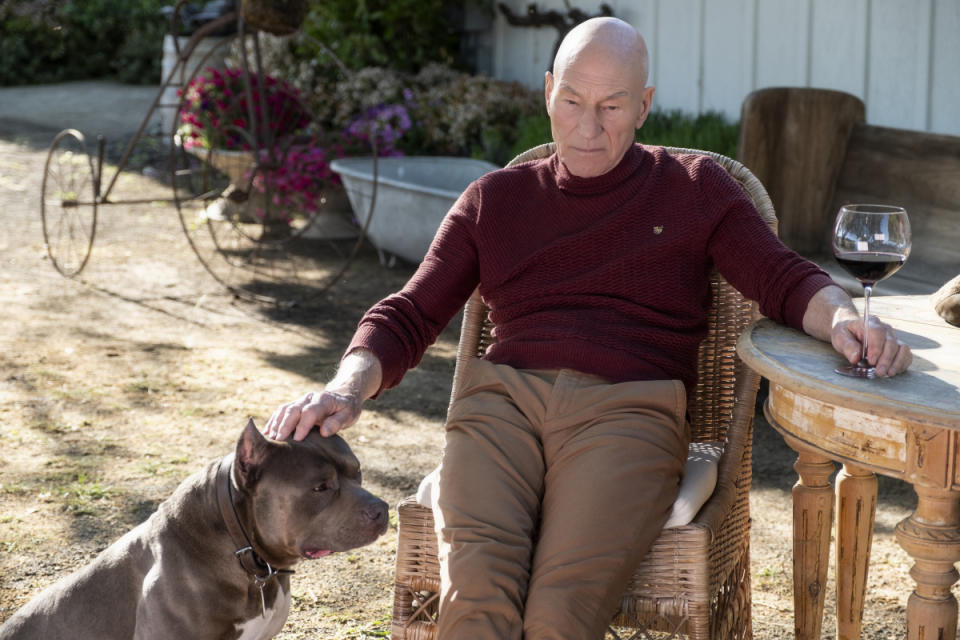'Picard’ is the Star Trek show we’ve been waiting for
It's a new and welcome direction for the franchise.
This article contains spoilers for the first episode of 'Star Trek: Picard'.
Star Trek: Picard, a brand-new drama that brings back fan-favorite character Jean-Luc Picard in an entirely new way, premiered yesterday on CBS All Access. The show is set two decades after the end of the last The Next Generation movie, the critically panned Nemesis, and follows threads set up in that film -- the centrality of the Romulans, the marriage of Deanna Troi and William Riker and the death of Data, the beloved android played by Brent Spiner.
The new series, which has already been renewed for a second season, opens with Jean-Luc Picard living a very different life than he used to. He's retired from Starfleet and returned to his family vineyards in La Barre, France. He lives a quiet life, but from the beginning, it's clear it's a little too contemplative. He has too much time to think about the past, about his regrets and the life he misses.
It doesn't take long for the show to fill in the gaps of what happened: After the Romulan supernova (which was first introduced in the J. J. Abrams Star Trek reboot), then-Admiral Picard convinced Starfleet to relocate the Romulans. But after a terrorist attack from rogue artificial lifeforms, Starfleet decided to pull back and focus on its own woes rather than helping a people traditionally considered an enemy. Jean-Luc fundamentally disagreed with that course of action.
Everything changes in an instant when the mysterious Dahj (played by Hamilton actress Isa Briones), who's being hunted by unknown forces, shows up on the former captain's doorstep. Her special abilities signal that she's something different, and indeed, Jean-Luc figures out that she may somehow be connected to Data. But Dahj is murdered before he has the chance to learn more, and it isn't until he visits Dr. Agnes Jurati (the always-excellent Alison Pill) that he finds out that Dahj may be the result of artificial intelligence cloning, and if that's the case, because they're created in pairs, she has a twin out there. It's safe to say that Jean-Luc sees Soji, Dahj's twin, as his chance at redemption, because he failed to protect Data all those years ago.
It's a fantastic premise on multiple levels, delivering the science and technology that fans have come to expect from the series in a way that is approachable for new fans. It's also daring -- it's clear that this first episode barely scratches the surface. The narrative storytelling in this series is going to be different than we've seen before from the franchise.

In an era when nostalgia seems to dominate programming, and networks and studios seem content with endless reboots and continuations of old shows and movies, it might be easy to think that Star Trek: Picard is more of the same. After all, doesn't bringing back this kind of universally loved character seem like a sure bet, especially after the mixed reactions to Star Trek: Discovery?
However, it's not that simple. Star Trek: Picard may bring back characters and be a continuation of a story set in motion over 30 years ago, but it's an entirely new development for the franchise. In reality, Star Trek: Picard is the prestige drama the franchise has been waiting for -- a significant departure from what's come before.
In this bold new story, Picard is in a very different situation than we last saw him. The man is the same, but the world has changed. That was Stewart's condition for returning to the role that made him a household name. "What I wanted to -- hoped we would -- address, and what I talked about in our early meetings before I accepted the offer, was that we would not be reflecting The Next Generation so much as the world the way it is today," Stewart told Engadget in a roundtable interview. "And how it has changed in the 19 years since we wrapped [Nemesis]. Because it has changed, and it is mostly changing in ways that are not good for the world, from Brexit to global warming."
"When we meet Picard, the circumstances of his life were very different than we would expect... But he is still very fundamentally Picard," said Alex Kurtzman, the mastermind behind the Star Trek franchise. "That was the key for us, making sure that, while circumstances have changed him, he's still the great leader that he was."
Star Trek has always been an allegory for the world we live in. But, as Stewart pointed out, we are currently very divided. And it was important to him and to Kurtzman that the show stay true to the nature of Star Trek by reflecting what we are facing.

"Star Trek has always been an amazing mirror that holds itself up to now, as is all the great science fiction," said Kurtzman. "And yes, it is a utopian vision of the future. Yes, it is an optimistic vision of the future in which our best selves rise to the top, in which all the things that divide us now, are afterthoughts... But you can't tell a political story that's allegorical without hitting what we're dealing with right now."
It's not just the world events that have altered, though. Between The Next Generation's premier in 1987 and now, television has changed drastically. While the traditional alien-of-the-week stories are certainly beloved by many audiences, those kinds of narratives no longer reflect the sophisticated storytelling that writers are able to do with television. Star Trek: Discovery does a solid job balancing those episodic narratives and larger arcs. But television these days is dynamic, and the producers are showing us that the Star Trek franchise is as well.
It was important to the production team to differentiate Picard from its predecessor. "I think if this just felt like it's Discovery: The Next Chapter... I think that wouldn't work," said executive producer Heather Kadin. "It looks different, it feels different and it's much more thoughtful and pensive, and it's not as big. There are no huge space battles, and not to say there won't be a space battle, but it's not what we're leading with."
"There are no huge space battles, and not to say there won't be a space battle, but it's not what we're leading with."
Multiple cast members, writers and producers have described the series as a 10-hour film, rather than a season of individual episodes. That makes Picard an incredibly risky endeavor, even perhaps more than Discovery was. The new flagship show of the franchise had a rocky start and took some time to find its footing, but it has evolved into an exciting and emotional series with many devoted fans (and also plenty of people who pretend like it doesn't exist).
Part of the problem is that as the single Star Trek show, Discovery had to be everything for everyone. It had to satisfy long-time fans who relied on the predictability of Star Trek's normal formula of storytelling while also drawing in new viewers who have become accustomed to a different kind of television show. On top of that, it was struggling under the weight of being launched on a subscription-only service, CBS All Access, that was trying to establish itself through its Star Trek offering.
That's a lot of expectation for a single show to carry, and I believe Discovery has met and exceeded those challenges as well as can be hoped. But now it has Picard to share the reins with, promising to be an entirely different kind of show and signaling that each iteration of Star Trek will be different to what came before.

The challenge that Picard faces is satisfying the legions of The Next Generation fans while also appealing to people who may only vaguely know who Jean-Luc Picard is or why he's important. It's a show dependent on the history that's come before, and yet needs to stand on its own two feet at the same time.
That tension, between new viewers and old fans, is something that writers and producers have been grappling with from the very beginning of this show. Akiva Goldsman, executive producer of Star Trek: Picard, said creating a show with such a deep history that was also welcoming to all viewers was "complicated."
"In anything that you're writing, if there's a lot of backstory... you don't necessarily start your story at the very beginning. You typically start in the middle of things then fill the audience in," explained Michael Chabon, the showrunner for Star Trek: Picard. "There are clumsy ways of doing that and there are artful ways of doing that, and you try to find the more artful ways."
'Picard' has accomplished its mission beautifully.
Goldsman explained that their approach to Star Trek: Picard was to treat it more as traditional science fiction and less like Star Trek. "It's not to say that Star Trek isn't science fiction," he hurried to clarify. But you also can't assume that audiences have the information you need them to know to tell a story, even in a franchise as deep as Star Trek. "So the question is how do you parse out, how do you titrate the narrative exposition along with the emotion in ways to carry the audience along with you?" said Goldsman.
That fine balance is what Star Trek: Picard is hoping to achieve in its 10-episode freshman run. Telling a story relevant to the world around us, which will be meaningful to longtime fans while also delivering something different to what has come before, all through one of the most beloved characters in modern television history. It's no easy feat and yet judging from the first three episodes (which comprise the first act of the inaugural season), Picard has accomplished its mission beautifully.

